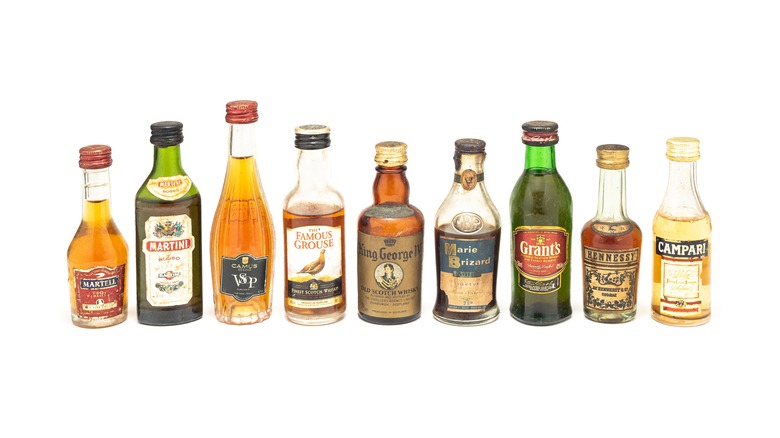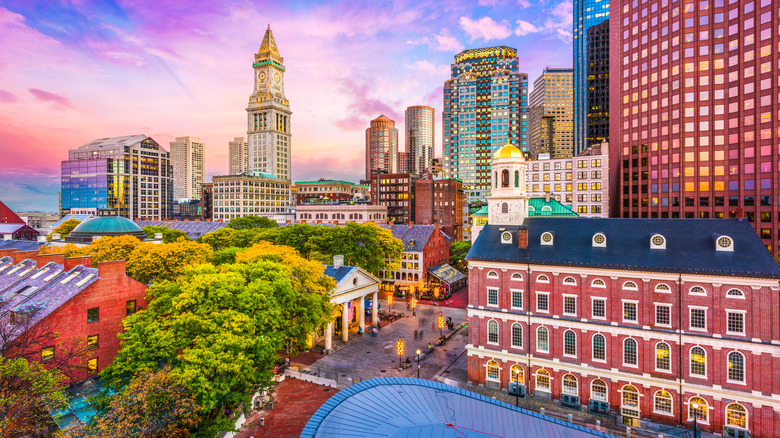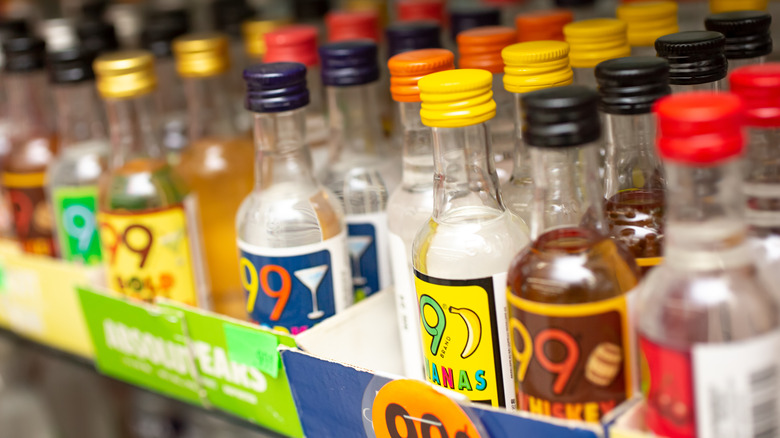Boston Is Coming For Tiny Liquor Bottles, Here's Why
You might know them better as 'nips' or 'shooters;' cutesy names for cutesy little bottles of booze (specifically those between 50 and 100 milliliters). You could go to any liquor store, and there's an all but certain chance that mini bottles of vodka, whiskey, tequila, and your other favorite libations are prominently displayed by the register. They're one of the first things you see when you walk through the door and the last thing you see before finalizing your purchase.
But the place you're most likely to see them isn't in the store. It's on the ground. Sidewalks, streets, parks, beaches, and waterways are littered with these things, generating stories like that of Cynthia Chesky, who, over the course of a month, collected 7,000 mini liquor bottles in Bristol, Connecticut. It's a town with roughly 60,000 residents, so you can imagine how much of this waste must be showing up in larger cities.
In 2020, The Providence Journal labeled miniature liquor bottles "a littering epidemic," and that's just the tip of the iceberg. The real kicker is that miniature liquor bottles are neither recyclable nor biodegradable, meaning that even when properly disposed of, they add to landfills. This has become a significant concern across all levels of government, and in 2021, New Mexico banned the sale of mini bottles altogether. Now, one of the nation's most prominent cities, Boston, is considering doing the same, generating a lot of controversy.
The proposed ban on mini bottles targets littering and alcohol abuse
Boston City Council member Ricardo Arroyo has proposed a citywide ban on the sale of alcohol in bottles under 100 milliliters. In part, the proposal aims to reduce litter, but Arroyo also sees it as a measure to reduce alcohol abuse and related crimes, particularly drunk driving. One of the biggest concerns about tiny liquor bottles is how easily they can be concealed. Drivers who get pulled over can hide such bottles on their person or in their car; or flick them out the window to escape detection. Furthermore, underage drinkers can hide mini bottles from parents or teachers with far greater ease than full liters. Finally, Arroyo has argued that the cheap nature of these containers, which typically sell for just 99 cents, makes alcohol more accessible, increasing the chance of abuse.
Arroyo's proposal follows similar bans enacted by several smaller New England cities in recent years. He cited the nearby city of Chelsea, which banned mini bottle sales in 2018 and subsequently saw significant changes. The year before the ban was enacted, Chelsea ambulances answered 742 calls for alcohol-related emergencies, but in 2018, they faced 556. Hospitalizations for alcohol issues also dropped, and the number of people taken into protective custody for intoxication fell by 20%. In Falmouth, on Cape Cod, tiny liquor bottles accounted for 32% of litter cleanup, but after the city banned them in 2021, the percentage dropped to six.
Liquor retailers fear financial losses
It should come as no surprise that the proprietors of Boston's liquor stores (of which there are approximately 280) strongly oppose the proposed ban on miniature bottles. You see, there's a flipside to such measures, and once again, the city of Chelsea is a perfect example. In 2018, following the ban on mini bottles, Chelsea liquor shops lost a collective $6 million in sales. Meanwhile, towns adjacent to Chelsea saw a rise in liquor sales, demonstrating that people can simply shop outside the city limits. A store owner in Boston fears his city's proposed ban, telling the Associated Press that the small bottles account for roughly 15% of his sales. Store owners have also argued that the ban would not do as much to address alcohol abuse as Arroyo claims it will, instead increasing the demand for larger bottles.
The Massachusetts Package Store Association, which has advocated for Boston's liquor store owners, has proposed another solution to the issue of littering: a bottle deposit. Ten states currently have deposit programs for aluminum cans and other containers, in which consumers pay an additional fee when they buy drinks that they can be reimbursed for if they return the emptied ones. The containers are then returned to manufacturers, who clean and refill the bottles. Massachusetts already has such a program in place for cans, and any unclaimed deposits are passed along to the city to be reinvested in environmental programs. As of this writing, Boston's proposed ban has not been finalized.


